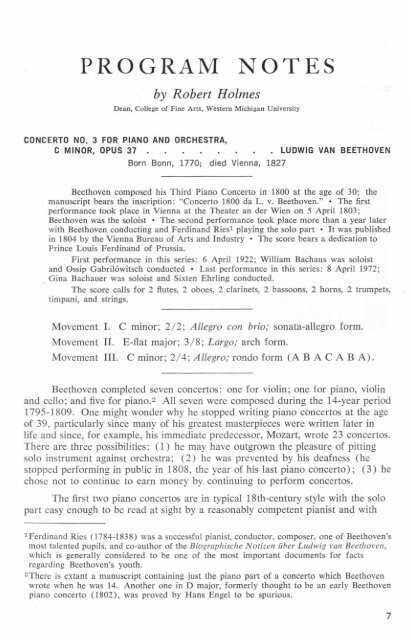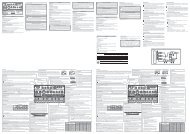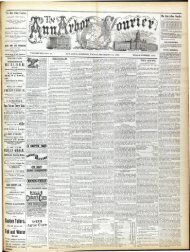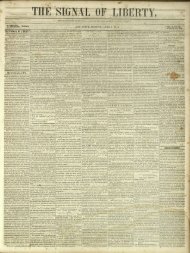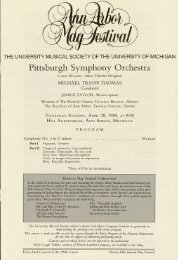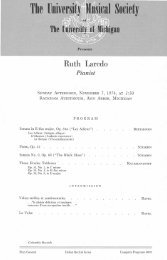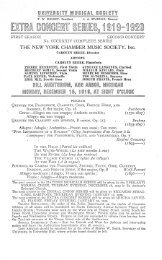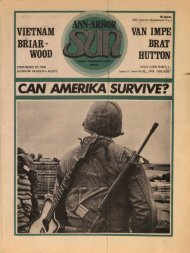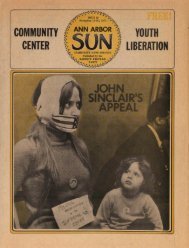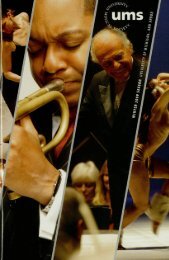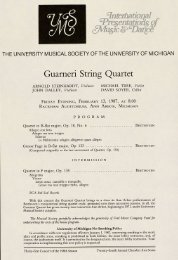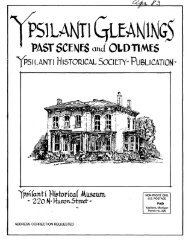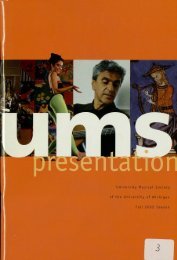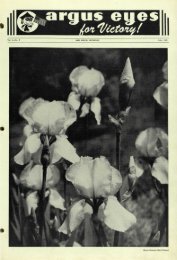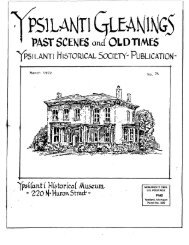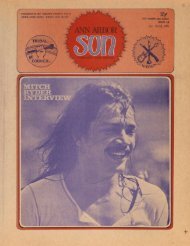DETROIT SYMPHONY ORCHESTRA - Ann Arbor District Library
DETROIT SYMPHONY ORCHESTRA - Ann Arbor District Library
DETROIT SYMPHONY ORCHESTRA - Ann Arbor District Library
You also want an ePaper? Increase the reach of your titles
YUMPU automatically turns print PDFs into web optimized ePapers that Google loves.
PROGRAM NOTES<br />
by Robert Holmes<br />
Dean, College of Fine Arts, Western Michigan University<br />
CON CERTO NO.3 FOR PIANO AND <strong>ORCHESTRA</strong>,<br />
C MINOR, OPUS 37 • LUDWIG VAN BEETHOVEN<br />
Born Bonn , 1770; died Vienna, 1827<br />
Beethoven composed his Third Piano Concerto in 1800 at the age of 30; the<br />
manuscript bears the inscription: "Concerto 1800 da L. v. Beethoven." • The first<br />
performance took place in Vienna at the Theater an der Wien on 5 April 1803;<br />
Beethoven was the soloist • The second performance took place more than a year later<br />
with Beethoven conducting and Ferdinand Ries 1 playing the solo part • It was published<br />
in 1804 by the Vienna Bureau of Arts and Industry • The score bears a dedication to<br />
Prince Louis Ferdinand of Prussia.<br />
First performance in this series: 6 April 1922; William Bachaus was soloist<br />
and Ossip Gabril6witsch conducted • Last performance in this series: 8 April 1972;<br />
Gina Bachauer was soloist and Sixten Ehrling conducted.<br />
The score calls for 2 flutes, 2 oboes, 2 clarinets, 2 bassoons, 2 horns, 2 trumpets,<br />
timpani, and strings.<br />
Movement I. C minor; 2/ 2; Allegro can. brio; sonata-allegro form.<br />
Movement II. E-flat major; 3/ 8; Largo; arch form.<br />
Movement III. C minor; 2/ 4; Allegro; rondo form (A B A CAB A).<br />
Beethoven completed seven concertos: one for violin ; one for piano, violin<br />
and cello; and five for piano. 2 All seven were composed during the 14-year period<br />
1795-1809. One might wonder why he stopped writing piano concertos at the age<br />
of 39, particularly since many of his greatest masterpieces were written later in<br />
life and since, for example, his immediate predecessor, Mozart, wrote 23 concertos.<br />
There are three possibilities: (1) he may have outgrown the pleasure of pitting<br />
solo in trument against orchestra; (2) he was prevented by his deafness (he<br />
stopped performing in public in 1808, the year of his last piano concerto); (3) he<br />
cho e not to continue to earn money by. continuing to perform concertos.<br />
The fiL t two piano concertos are in typical 18th-century style with the solo<br />
part easy enough to be read at sight by a reasonably competent pianist and with<br />
lFerdinand Ries (I 784-1838) was a successful pianist. conductor, compo er. one of Beethoven's<br />
most talented pupils, and co-author of the Biographische Notizel/ iiber Ludwio \'all Beethovel/,<br />
which is generally considered to be one of the most inlportant documents for facts<br />
regarding Beethoven's youth.<br />
2There is extant a manuscript containing just the piano part of a concerto which Beethoven<br />
wrote when he was 14. Another one in D major, formerly thought to be an early Beethoven<br />
piano concerto (1802), was proved by Hans Engel to be spuriou .<br />
7


